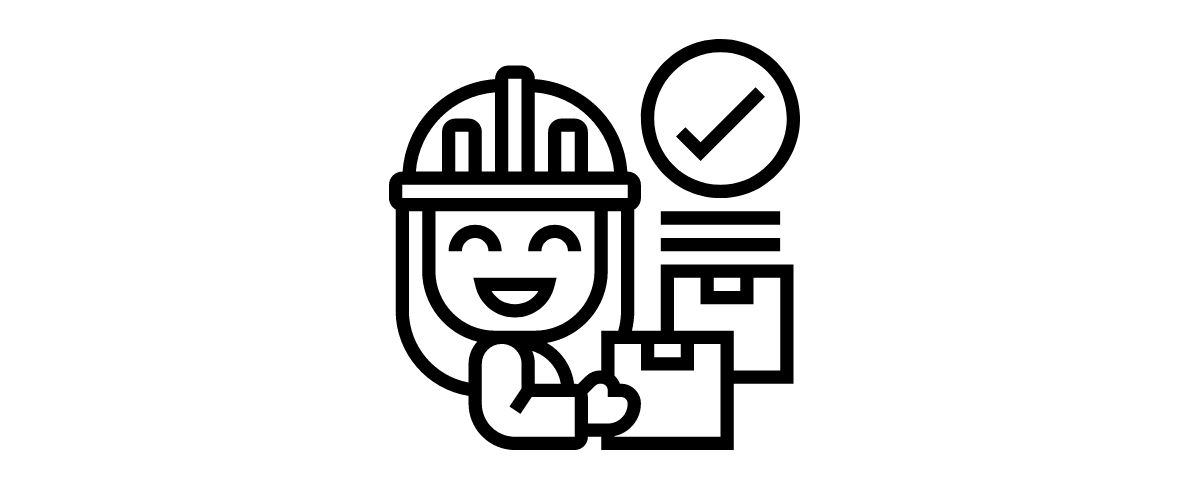
When a customer purchases an item, they expect that item to work, look, and feel as advertised, and even the smallest deviation from their expectations could negatively affect their experience or even prompt them to make a return. Sticking to the script and producing consistent, reliable products isn’t just good for company reputation, it is essential to comply with government regulations and industry standards.
Consistency is key, which is why manufacturers invest in measures to detect flaws and inconsistencies before they leave the factory floor.
Quality inspectors are charged with the important task of learning the details of a company’s products, then carefully inspecting everything to assure quality and consistency. An important position in any manufacturing company, quality inspectors are typically members of management staff and receive excellent benefits and pay.
Despite the importance of the position, quality inspectors often do not hold college degrees, and the field as a whole is more accessible to people not wanting to pursue higher education.
If you learn quickly, have an eye for detail, enjoy engineering and mathematics, and want to work in a technical field, a career as a quality inspector could be in your future. In this guide, you’ll learn all the basics of what a quality inspector does daily, what it takes to become a quality inspector and the benefits of working in this challenging and often lucrative field.
Job Description: Quality Inspector
Put simply, the responsibility of a quality inspector is to assess raw materials coming-in to a manufacturing facility and to assess finished products leaving for final sale. Quality inspectors know everything about the products being manufactured at their plant, enabling them to quickly identify flaws in the process before they can affect the final product.
Quality inspectors carefully study blueprints and manufacturing guides, become familiar with the industry and government regulations, learn to operate and troubleshoot tools, machinery, and industrial furniture, and serve as the first and final point of approval for all products and materials.
Day-to-Day Responsibilities
A quality inspector’s work begins with the studying of manufacturing guidelines and blueprints to become familiar with the technical specs and overview of a product. Similarly, quality inspectors will also familiarize themselves with safety and government regulations for whatever type of product they are manufacturing.
Before the manufacturing process can begin, all materials and parts need to be reviewed and checked for quality, which is the responsibility of the quality inspector. If materials or parts are approved, the process of manufacturing can begin.
If the materials are not up to the required standards, the quality inspector will recommend an alternative or solution.
During the manufacturing process, quality inspectors watch for issues in the production line, ensuring all employees are complying with standard practices and procedures. When something goes wrong, a quality inspector will need to be able to use the tools of the trade to demonstrate or make corrections.
Once products or components have been manufactured, and before they can be packaged and shipped, they need to be inspected. Quality inspectors check finished products and batches carefully for any fault or flaw, turning away anything that doesn’t meet quality standards.
Once items are cleared, they are ready to move on to be sold and are considered safe for use by consumers.
At OnePointe Solutions, we’ve supplied quality inspectors with efficient custom workbenches and durable packing stations to improve the flow of their production line to keep things running smoothly in the manufacturing process.
Workplace Environment
Because quality control is necessary throughout every step of the manufacturing process, quality inspectors are often working in one place and on one task during their entire shifts. Since many items may need to be inspected throughout the day, the job is often repetitive and requires steady focus and comfort sitting or standing for long periods.
Because quality inspectors are also required to help set standards for manufacturing, time not spent actively inspecting products or materials is usually spent assessing various processes and creating new guidelines and written procedures for improved methods of production. Quality inspectors create, write, and distribute these materials, then work with other members of management to ensure new rules are widely adopted.
If you choose a career as a quality inspector, you can expect to experience:
- Full shifts doing one task
- Repetitive tasks
- Reviewing blueprints, rules, documents, etc.
- Creating new standards, writing educational and instructive documents, distributing educational materials
- Working with management-level employees to teach and manage standards
- Creating/finding creative solutions to problems as they arise
- Lifting or carrying tools, equipment, parts, materials, or products and dealing with industrial furniture or equipment.
- Using tools and performing technical skills
Qualifications to Become a Quality Inspector
Quality inspectors work in a wide range of manufacturing environments, from food and pharmaceutical products to automotive and industrial manufacturing. Some companies seek out quality inspectors with specific skills, for instance, individuals with a background in food sciences for a job inspecting food.
In other cases, manufacturers seek someone with a sharp eye for detail and the ability to quickly learn, synthesize, and use information – someone with the right attitude and skill set.
Most often, quality inspectors are individuals who do not hold a post-secondary degree, and instead have some kind of relevant experience. Unlike other managerial positions, quality inspectors do not need extensive formal education and instead qualify based on ability.
In general, these are the qualifications you’ll need to become a quality inspector:
Education
There are no formal education requirements to become a quality inspector, and most professionals in this position have only a high school education or equivalent. In some cases, the knowledge and technical skills needed to assess quality require companies to seek out candidates with more formal education, or specific professional experience in their field.
Medical devices and pharmaceutical labs developing new drugs, for example, may need to be inspected by someone with an understanding of chemistry, medicine, etc. Most commonly, quality inspectors receive an informal education in the manufacturing process starting in an entry-level position and gaining relevant experience to become qualified for the job of the quality inspector.
Certifications
If you do not have a formal education, but want to prove your dedication to learning about and becoming an expert in a given topic, consider getting certified by relevant organizations. Gaining certifications that prove you are capable and knowledgeable will improve your chances of qualifying for a full-time position as a quality inspector since you will have shown that you are already dedicated to the work.
Organizations like the American Society for Quality offer a variety of relevant certifications for professionals seeking work as quality inspectors.
Special Skills
In addition to basic education requirements and optional certifications, many employers look for candidates with special skills needed for the work you’ll do as a quality inspector. Some skills can be learned or developed over years of work and experience, but others are innate or natural and are specific personality traits that may make you more or less suited to the work.
Some skills to highlight if you are seeking work as a quality inspector include:
- Confident using various pieces of equipment, technology, or software after little instruction
- An eye for technical detail
- A good memory
- Math, science, and engineering skills
- Ability to stand, sit, or walk for extended periods
- Ability to lift, hold, and move heavy objects
- Comfortable enforcing procedures and training
- Flexible and able to address problems as they arise
Average Quality Inspector Salary & Benefits
Unlike other management positions that require a huge amount of formal experience to qualify, a job as a quality inspector is achievable for individuals from a wide range of professional and educational backgrounds. If you have what it takes to be a quality inspector, you could have a long, successful career, and could make a comfortable salary as a result.
In North America, the average quality inspector salary is between $40K and $60K, though this number may vary depending on the specific industry. If your position required more training and education, your salary should reflect this.
In addition to a comfortable salary, quality inspectors enjoy paid leave, quality health insurance, pension plans, and vacation time.
The Path to Becoming a Quality Inspector
No matter who you are or what your background is, you could become a quality inspector if you have an eye for detail, the patience to learn a subject inside and out, and the teaching skills to train staff on proper procedures. If you think this describes you, follow this simple path to becoming a quality inspector:
1. High School Diploma or GED
Most companies prefer their inspectors to have graduated high school or obtain a GED.
2. More Education
While postsecondary schooling is not required, a postsecondary degree in a relevant field may improve your chances of being hired. For example, if you wish to work as a quality inspector for an automotive manufacturer, a degree in mechanical engineering may make your application stand out.
3. Relevant Experience
Before you commit to a career as a quality inspector, try finding work in a similar environment to find out whether or not you enjoy it. Working an entry-level position in a manufacturing job is a great introduction to the type of environment you would be working in day-to-day as a quality inspector, and can prepare you for the various challenges of working in a factory.
4. Earn Certifications
Once you have gained some experience and feel confident that you want to work as a quality inspector, try earning certifications to beef up your resume.
5. Apply
Finally, apply! When you see a position you think you could qualify for, apply! If you can show that you are enthusiastic, will learn as you go, and have the right base of knowledge to get started, you’ll be starting your career in no time!
Need Help Designing Your Industrial Space?
Give us a call at (866) 222-7494 to speak to an industrial specialist today! We can supply your facility with high-quality industrial furniture to keep your plant moving smoothly without compromising the flow of production.


